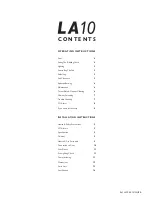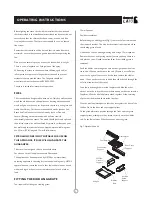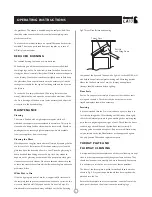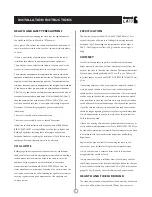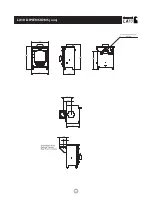
HEALTH AND SAFETY PRECAUTIONS
Please take care when installing the stove that the requirements of
the Health and Safety at Work Act 1974 are met.
Some types of fire cement are caustic and should not be allowed to
come into contact with the skin. In case of contact wash with plenty
of water.
If there is a possibility of disturbing any asbestos in the course of
installation then please use appropriate protective equipment.
There must not be an extractor fan fitted in the same room as the
stove as this can cause the appliance to emit fumes into the room.
. Approved
Document J of the building regulations gives more detailed
information.
This stove is capable of intermittent operation.
This stove is not suitable for use in a shared flue system.
In addition to these instructions the requirements of BS.8303 and
BSEN 15287-1:2007 must be fulfilled. Local Authority Bylaws and
Building Regulations, including those referring to national and
European Standards, regarding the installation of Solid Fuel burning
appliances, flues and chimneys must also be observed.
CO ALARMS
Building regulations require that whenever a new or replacement
fixed solid fuel or wood/biomass appliance is installed in a dwelling a
carbon monoxide alarm must be fitted in the same room as the
appliance. Further guidance on the installation of the carbon
monoxide alarm is available in BS EN 50292:2002 and from the
alarm manufacturer's instructions. Provision of an alarm must not be
considered a substitute for either installing the appliance correctly or
ensuring regular servicing and maintenance of the appliance and
chimney system.
There must be an adequate air supply into the room in which the
appliance is installed to provide combustion air. The combustion air
supply must be via a permanently open vent. The requirement for
minimum free area is partly dependent on the design air permeability
of the house. In older properties the air permeability will be above
3
2
5.0m /(h.m ), and there is no statutory requirement for this size of
3
2
stove but in some modern properties if it is less than 5.0m /(h.m ),
2
2
then the minimum free area of vent is 27.5cm (4.3in ).
The vent
must be positioned such that it is not liable to blockage
SPECIFICATION
CHIMNEY
HEARTH AND FIRE SURROUND
The nominal output of the LA10 is 4.8 kW (16,300 Btu/h). This
output is based on a 45minute re-fuelling cycle burning seasoned
hardwood logs. The average flue temperature at rated output is
266°C. The Flue gas mass flow is 4.8g/s and the stove weight is
62kg.
In order for the appliance to perform satisfactorily the chimney
height must not be less than 4 metres measured vertically from the
outlet of the stove to the top of the chimney. The internal dimensions
of the chimney should preferably be 175 mm (7 in.) or 200mm (8
in.) either square or round and MUST NOT BE LESS THAN 125 mm
(5 in.).
If an existing chimney is to be used it must be swept and checked, it
must be in good condition, free from cracks and blockages, and
should not have an excessive cross sectional area. If it was previously
used by an open fire then the chimney should be swept one month
after installation to clear any soot falls which may have occurred due
to the difference in combustion between the stove and the open fire.
If you find that the chimney is in poor condition then expert advice
should be sought
regarding the necessity of having the chimney lined.
If it is found
necessary to line the chimney then a lining suitable for
Solid Fuel must be used.
If there is no existing chimney then a prefabricated block chimney or
a twin walled insulated stainless steel flue to BSEN 15287-1:2007 can
be used either internally or externally. These chimneys must be fitted
in accordance with the manufacturers instructions and Building
Regulations.
Single wall flue pipe is suitable for connecting the stove to the
chimney but is not suitable for using for the complete chimney.
If it is found that there is excessive draw in the chimney then a
draught stabiliser should be fitted.
It is important that there is sufficient draw in the chimney and that
the chimney does not suffer from down-draught. When the chimney
is warm the draw should be not less than 2.5mm (0.10 inches) water
gauge (25 Pa). If in doubt about the chimney seek expert advice.
The stove must stand on a fireproof hearth and must not be situated
closer than 600mm from the sides and 700mm from the rear to
9
®
INSTALLATION INSTRUCTIONS
charnwood
Summary of Contents for LA10
Page 1: ...Operating Installation Instructions charnwood ...
Page 2: ......
Page 12: ... LA10 DIMENSIONS mm 12 charnwood ...
Page 15: ......



